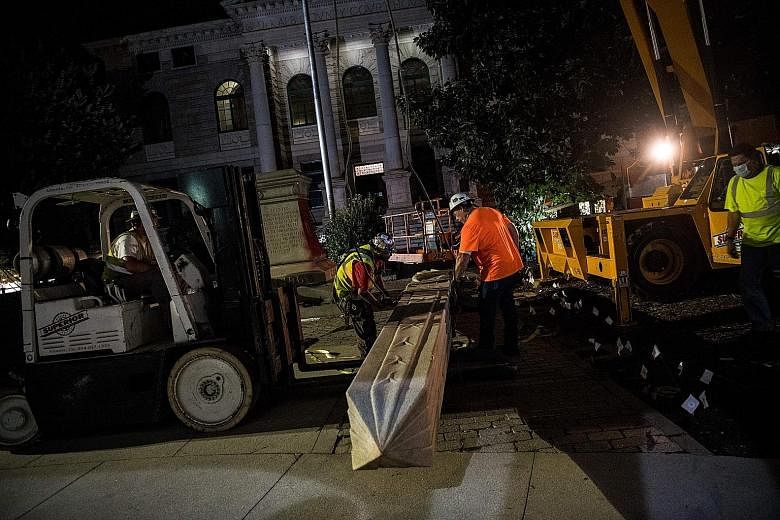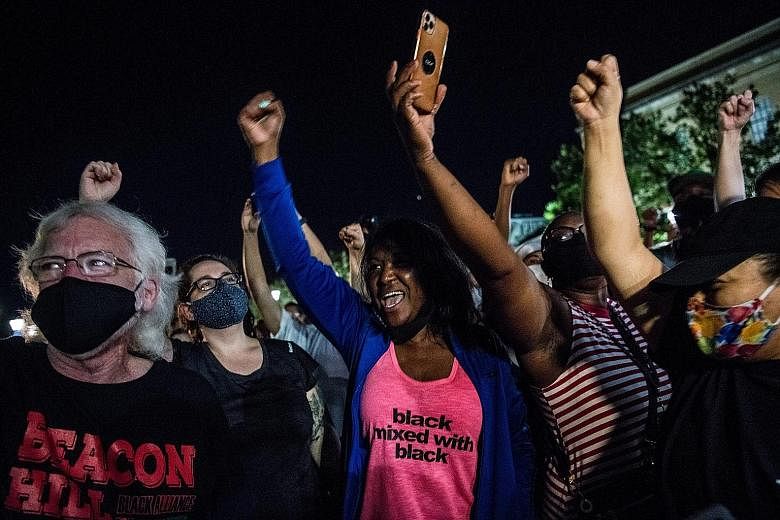WASHINGTON • The United States marked the end of slavery by celebrating Juneteenth yesterday, with the annual unofficial holiday taking on renewed significance as millions of Americans confront the nation's living legacy of racial injustice.
Rallies, prayers and cultural celebrations of food and music were set to enliven communities from New York to Los Angeles to honour the day in 1865 when a Union general proclaimed in Galveston, Texas, that all slaves were free.
Several commemorations went virtual to account for the coronavirus pandemic, but many were going ahead as planned or with modifications such as social distancing and mask-wearing guidelines.
Early yesterday, several streets in downtown Washington were closed to traffic and there was a strong police presence in the new "Black Lives Matter" plaza near the White House, where protesters were to converge in the afternoon.
Some 155 years after the demise of the pro-slavery Confederacy, several tragedies have led the US into a reckoning on race.
They have also energised a quest for equality among African Americans who decry how systemic racism and injustice have been allowed to fester in the world's flagship democracy.
Forty-six-year-old African American George Floyd was killed on May 25 when a white Minneapolis police officer pressed his knee onto Mr Floyd's neck for nearly nine minutes and ignored his multiple pleas of "I can't breathe".
Video of the horrific incident triggered coast-to-coast protests against racial injustice and police brutality. Millions took to the streets under the Black Lives Matter banner.
Further fuelling tensions, an officer in Atlanta last week shot dead a black man who was running away after a scuffle with police.
Both offending officers in the incidents have been charged with murder, and the killings have spurred US lawmakers to introduce sweeping new police reforms.
As Americans grapple with their country's legacy, Juneteenth has the potential to amplify calls for action and reform.
Protests were scheduled in cities like Tulsa, Oklahoma, which hosted a day-long rally for justice.
Dozens of events throughout New York were set to mark the holiday, including a march to City Hall demanding "justice, dignity and equality" for black Americans.
Pressure has mounted for Juneteenth to be declared a national holiday. New York and Virginia have moved to make it an official state holiday. Several major US companies including Nike and Twitter recently announced they were making Juneteenth a paid holiday for employees.
US President Donald Trump had initially scheduled a huge campaign rally on Juneteenth in Tulsa, Oklahoma, his first since the pandemic began. He faced an outcry over his provocative choice of date and location - Tulsa suffered one of the country's worst racist massacres, in 1921, when as many as 300 black Americans were killed - and Mr Trump changed the rally to today, out of respect, he said.
"Nobody had ever heard of it," Mr Trump claimed in a Wall Street Journal interview on Thursday. "I did something good," he added. "I made Juneteenth very famous."
AGENCE FRANCE-PRESSE


